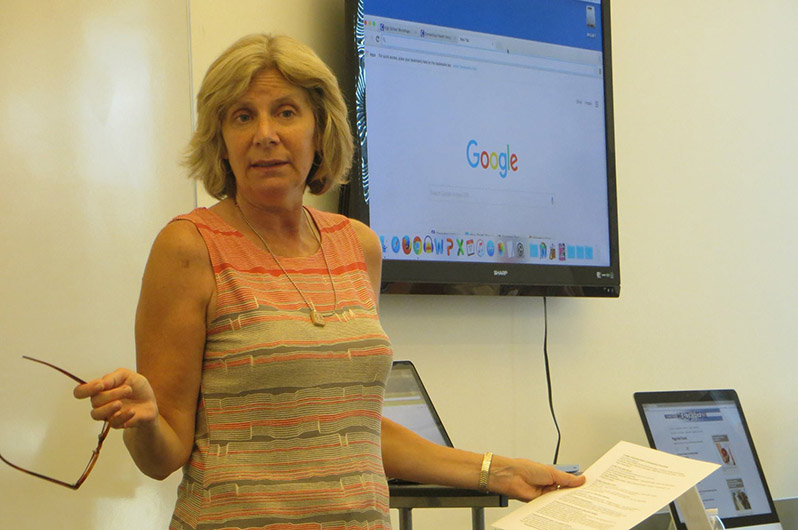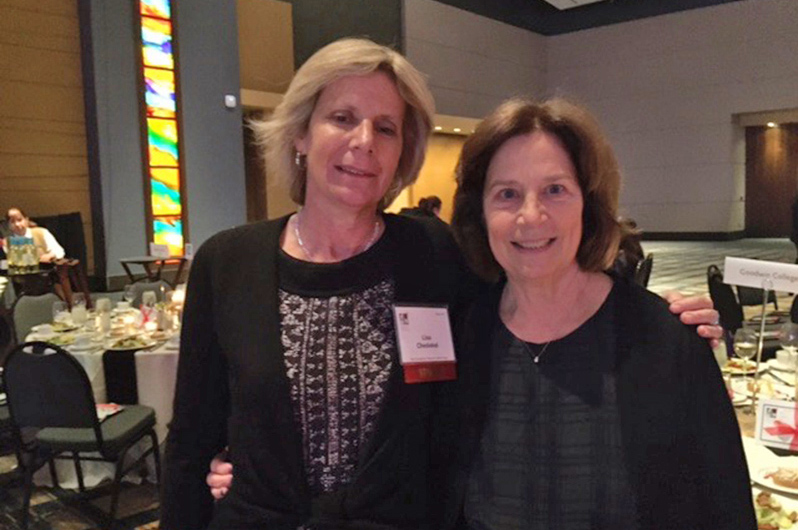In Memoriam: Lisa Chedekel.
A decade ago, the School of Public Health was looking for a writer to tell the stories of its research faculty. Sharon Britton, who was then SPH communications director, was scrolling through some 60 resumes when she found the one from a Pulitzer Prize-winning Connecticut newspaper reporter.
Lisa Chedekel specialized in chronicling human stories behind often-misguided health policy. She’d co-authored a 2006 Hartford Courant investigative series that exposed the Pentagon for sending mentally unfit troops into combat in Iraq and recounted the stories of a number of those soldiers who had committed suicide. The series prompted the military, under pressure from Congress, to adopt new rules to protect mentally troubled soldiers.
“I thought, Omigod, could we actually hire her?” Britton recalled. “I called her up. I told her, ‘You’ve got to come and work here.’ “
Britton convinced Chedekel—but then worried that the irreverent, blunt-spoken veteran journalist, who hadn’t been on a job interview in 20 years, might stumble during the official hiring process. “She was clueless about self-promotion,” Britton said. “She wasn’t going to go into a room and say, ‘I won a Pulitzer Prize.’ All she wanted to talk about were stories.”
Chedekel did get hired, though, and she proved to be a master at promoting other people’s work. “She could sell you better than you could sell yourself,” says Catharine Wang, an associate professor of community health sciences.
Chedekel, who was SPH’s senior writer/media relations director and in her 10th year at BU, died of cancer on January 12. She was 57. She leaves her wife, Isabel Morais, an obstetrician/gynecologist who is chief of the maternity department at St. Elizabeth’s Medical Center, and their 18-year-old twins, Bernard, an aspiring scientist, and Evelyn, a writer, both seniors at Newton North High School.
Dean Sandro Galea wrote in an email to his senior leadership team: “She gave SPH a voice that helped us stand out.” He went on to say that they would remember Chedekel most for ”her dry wit … her good common sense … the ferocity with which she loved what she did … [and] her compassion and deeply felt humanity.”
In the weeks since her death, others across SPH, along with Chedekel’s wide circle of friends and former colleagues, as well as people she had interviewed over the years, have mourned her in online tributes that tell of a writer who championed the underdog—and loved a good story.
Walter Robinson, who led the Pulitzer-winning Boston Globe Spotlight team that uncovered the Catholic church sex-abuse scandal, posted: “She was a 150-watt bulb in a world of 60-watters.”
George Annas, professor in the Center for Health Law, Ethics & Human Rights, declared Chedekel “the most thoughtful and insightful” of the hundreds of journalists he’d worked with over four decades: “She consistently strived to convey the story she was working in a way that was both compelling and suggested how it might be used by readers to make their own lives or the lives of others better.”
Warren Henthorn—whom Chedekel had interviewed for the Courant about the suicide of his 25-year-old son, Jeffrey, during his second Army tour in Iraq—wrote on her Legacy site: “There is no telling how many soldiers’ lives were saved by her efforts over the years. Thank you, Lisa.”
Chedekel turned hundreds of academic studies into engaging stories for SPH, BU Today, Research, and Bostonia. She pushed hard to get the faculty’s research—and their op-eds — into The New York Times, the Washington Post, the Boston Globe, STAT, NPR, and other news outlets.
“She made me feel like I had something worthwhile to say, whenever I doubted myself (which was all the time),” Emily Rothman, associate professor of community health sciences who studies human trafficking and teens and pornography, posted on her SPH colleague Lauren Wise’s Facebook site. “She would say, ‘No! This is great stuff! Let me send it around!’”
It is thanks to Chedekel’s media training, says Michael Siegel, professor of community health sciences, that he is a widely quoted expert on gun control, secondhand smoke effects, and e-cigarettes. “She taught me that if you are honest and responsive and provide good quotes, reporters will turn to you as a ‘go-to person,’” he says.
Chedekel worked part-time at SPH so she could also devote herself to the Connecticut Health Investigative Team (C-HIT), the award-winning, nonprofit, web-based health news service she started in 2010 with her former Courant colleague, Lynne DeLucia. She mentored younger writers through C-HIT and at Northeastern University, where she taught journalism from 2010 to 2014, helping students publish their stories on the Boston Globe’s website.
But even juggling three jobs, she showed up for her son Bernie’s crew meets and her daughter Evie’s hockey games and plays. Chedekel and Morais “both agreed that their children would always be at the center of their lives,” Rabbi Robert Goldstein said, delivering Chedekel’s eulogy at Temple Emanuel, in Andover, Massachusetts. “And they always were.”
One of Chedekel’s first stories for BU, about an SPH-supported landmark report by a federal panel of experts concluding that one in four veterans suffered from Gulf War illness, drew nationwide media coverage—and practically shut down the school’s website. “Hundreds of thousands of people clicked on it to get access to the review,” says environmental health professor Roberta White, scientific advisor to the panel that produced the report.
Chedekel made sure the report was also posted on the U.S. Department of Veterans Affairs website. “SPH is known for protecting the availability of documents on Gulf War illness due to Lisa’s efforts,” says White.
While building relationships with many SPH researchers, Chedekel, as she had in her newspaper days, took a special interest in those who might otherwise be overlooked. “She had a real passion for helping junior faculty, especially women, establish themselves,” says Kara Peterson, executive director of communications.
“Lisa caught us early in our careers,” says Wang, who studies genetic testing. “We didn’t know how to network, how to sell ourselves, how to disseminate our work. She showed us ways to do it. She’d get me, why I do what I do, what I was really geeked out about.”
Epidemiologist Lauren Wise was launching a national research project on fertility when she approached Chedekel. “I said, ‘I have this new study and I want to get the word out about it,’” says Wise. “She said, ‘I would love to help you do that.’ You knew she was this Pulitzer Prize winner, this living legend, and yet she was so modest. You knew she was going to put together something brilliant.”
Kimberly Sullivan, research assistant professor of environmental health, was also the recipient of Chedekel’s laser-like attention. “She supported my work with veterans with Gulf War illness as if it was the most important thing she could be writing about,” says Sullivan.
But Chedekel was also the media gatekeeper, informing faculty when she thought their latest research wasn’t newsworthy. “She’d say, ‘That’s a pretty small study, isn’t it?” says Multimedia Director Mike Saunders, a former Boston Globe editor and reporter.
She was direct in staff meetings, too. “If someone came up with something she thought was a bad idea, she’d say so,” says Saunders. “People respected her for her honesty. She was a throwback to the old newsroom culture—you have a blow-up with someone over a story and then you go out for beers later.”
For a fast writer who thrived on daily newspaper deadlines, the pace of academia was an adjustment. “She’d say, ‘Why do they need to appoint a committee to form a committee—why don’t they just make a decision,’” recalls Peterson. “But she loved the school, and the faculty adored her.”
She never missed a deadline—or the chance for a wry aside. “I just filed a story on Wendy Davis,” Chedekel wrote in an email to a colleague about the former Texas Senator’s talk at SPH in January 2016, timed to coincide with the 43rd anniversary of the US Supreme Court’s Roe v. Wade decision. “I like that she’s encouraging women to talk about abortion…. Plus? She had a really good blonde dye job. I want her hair stylist!”
The only child of a shoe manufacturer and a social worker, Chedekel grew up in Andover, played varsity lacrosse for Phillips Academy Andover, earned an English degree from Wesleyan University in 1982, and began working at smaller Connecticut newspapers before joining the Courant in 1992. In 1999, she was part of a Courant reporting team that won the Pulitzer for coverage of the deadly shooting rampage at Connecticut Lottery headquarters. She left the Courant in 2008, when she joined SPH.
What drove Lisa Chedekel? Rabbi Goldstein, in his eulogy, called it “righteous indignation.” He explained: “Indignation calls for action; a desire to find the cause of the injustice.”
Morais says Chedekel’s interest in health reporting was sparked, more than 15 years ago, by her father Paul’s Alzheimer’s disease (he died in 2005). Visiting him at a rehabilitation center after he underwent leg surgery, Chedekel found that the staff was using so-called medical restraints—“meaning sedating old people so they are not a bother or at risk of falling out of bed,” says Morais. “It was awful. She became quite angry at the system.”
Channeling that anger, she became “the scourge of the uncaring health-o-crats whom her investigative reporting targeted,” says Boston author Larry Tye, who runs the Blue Cross/Blue Shield Health Reporting Fellowship (Chedekel was a 2012 fellow).
Righteous indignation also connected Chedekel to SPH, and to its faculty tackling problems such as war and trauma, human trafficking, and pollution and inequality. “She chose to work for the School of Public Health because she believed in the value of making those kinds of findings widely available to the public,” says Morais. “And she believed in those scientists and wanted to promote their work.”
Tax-deductible donations can be made in Lisa Chedekel’s memory to a scholarship fund for high school students who attend C-HIT’s week-long summer reporting boot camps, or simply to C-HIT. Checks should be made out to Conn. Health I-Team, Inc., 346 Alden Ave. New Haven, CT 06515
Editor’s Note: Sara Rimer and Lisa Chedekel were close friends and colleagues. They bonded over being newspaper people in an academic world and struck up a close friendship. Sara graciously agreed to write this remembrance at the request of Dean Sandro Galea and we are grateful for her lovely remembrance that captures Lisa so well.








Comments & Discussion
Boston University moderates comments to facilitate an informed, substantive, civil conversation. Abusive, profane, self-promotional, misleading, incoherent or off-topic comments will be rejected. Moderators are staffed during regular business hours (EST) and can only accept comments written in English. Statistics or facts must include a citation or a link to the citation.